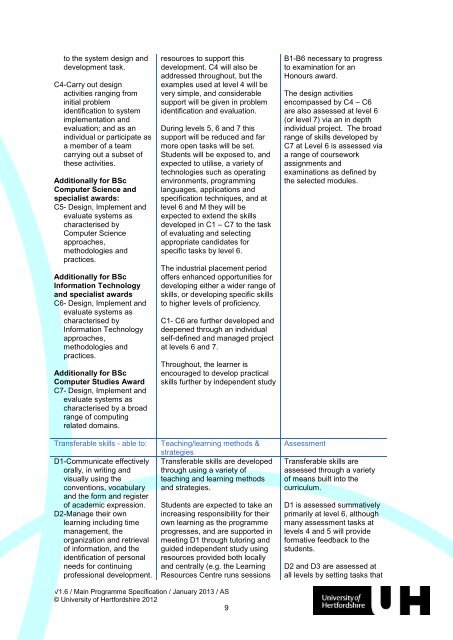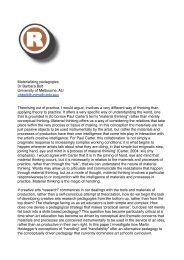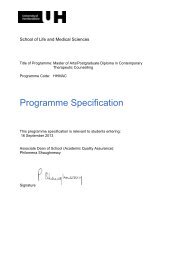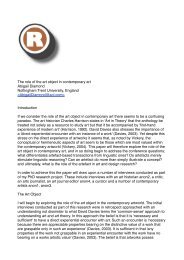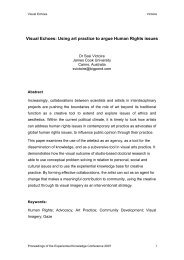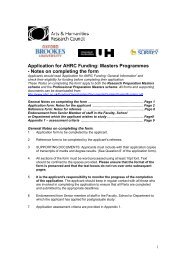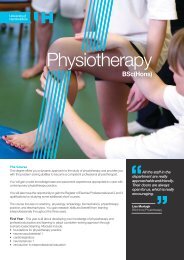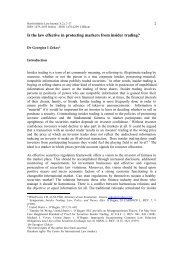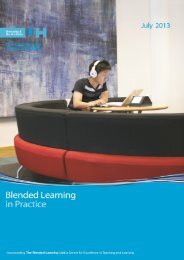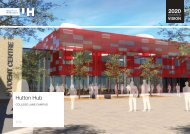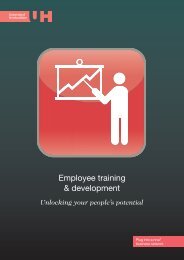Programme specification (pdf) - University of Hertfordshire
Programme specification (pdf) - University of Hertfordshire
Programme specification (pdf) - University of Hertfordshire
You also want an ePaper? Increase the reach of your titles
YUMPU automatically turns print PDFs into web optimized ePapers that Google loves.
to the system design and<br />
development task.<br />
C4-Carry out design<br />
activities ranging from<br />
initial problem<br />
identification to system<br />
implementation and<br />
evaluation; and as an<br />
individual or participate as<br />
a member <strong>of</strong> a team<br />
carrying out a subset <strong>of</strong><br />
these activities.<br />
Additionally for BSc<br />
Computer Science and<br />
specialist awards:<br />
C5- Design, Implement and<br />
evaluate systems as<br />
characterised by<br />
Computer Science<br />
approaches,<br />
methodologies and<br />
practices.<br />
Additionally for BSc<br />
Information Technology<br />
and specialist awards<br />
C6- Design, Implement and<br />
evaluate systems as<br />
characterised by<br />
Information Technology<br />
approaches,<br />
methodologies and<br />
practices.<br />
Additionally for BSc<br />
Computer Studies Award<br />
C7- Design, Implement and<br />
evaluate systems as<br />
characterised by a broad<br />
range <strong>of</strong> computing<br />
related domains.<br />
Transferable skills - able to:<br />
D1-Communicate effectively<br />
orally, in writing and<br />
visually using the<br />
conventions, vocabulary<br />
and the form and register<br />
<strong>of</strong> academic expression.<br />
D2-Manage their own<br />
learning including time<br />
management, the<br />
organization and retrieval<br />
<strong>of</strong> information, and the<br />
identification <strong>of</strong> personal<br />
needs for continuing<br />
pr<strong>of</strong>essional development.<br />
resources to support this<br />
development. C4 will also be<br />
addressed throughout, but the<br />
examples used at level 4 will be<br />
very simple, and considerable<br />
support will be given in problem<br />
identification and evaluation.<br />
During levels 5, 6 and 7 this<br />
support will be reduced and far<br />
more open tasks will be set.<br />
Students will be exposed to, and<br />
expected to utilise, a variety <strong>of</strong><br />
technologies such as operating<br />
environments, programming<br />
languages, applications and<br />
<strong>specification</strong> techniques, and at<br />
level 6 and M they will be<br />
expected to extend the skills<br />
developed in C1 – C7 to the task<br />
<strong>of</strong> evaluating and selecting<br />
appropriate candidates for<br />
specific tasks by level 6.<br />
The industrial placement period<br />
<strong>of</strong>fers enhanced opportunities for<br />
developing either a wider range <strong>of</strong><br />
skills, or developing specific skills<br />
to higher levels <strong>of</strong> pr<strong>of</strong>iciency.<br />
C1- C6 are further developed and<br />
deepened through an individual<br />
self-defined and managed project<br />
at levels 6 and 7.<br />
Throughout, the learner is<br />
encouraged to develop practical<br />
skills further by independent study<br />
Teaching/learning methods &<br />
strategies<br />
Transferable skills are developed<br />
through using a variety <strong>of</strong><br />
teaching and learning methods<br />
and strategies.<br />
Students are expected to take an<br />
increasing responsibility for their<br />
own learning as the programme<br />
progresses, and are supported in<br />
meeting D1 through tutoring and<br />
guided independent study using<br />
resources provided both locally<br />
and centrally (e.g. the Learning<br />
Resources Centre runs sessions<br />
B1-B6 necessary to progress<br />
to examination for an<br />
Honours award.<br />
The design activities<br />
encompassed by C4 – C6<br />
are also assessed at level 6<br />
(or level 7) via an in depth<br />
individual project. The broad<br />
range <strong>of</strong> skills developed by<br />
C7 at Level 6 is assessed via<br />
a range <strong>of</strong> coursework<br />
assignments and<br />
examinations as defined by<br />
the selected modules.<br />
Assessment<br />
Transferable skills are<br />
assessed through a variety<br />
<strong>of</strong> means built into the<br />
curriculum.<br />
D1 is assessed summatively<br />
primarily at level 6, although<br />
many assessment tasks at<br />
levels 4 and 5 will provide<br />
formative feedback to the<br />
students.<br />
D2 and D3 are assessed at<br />
all levels by setting tasks that<br />
V1.6 / Main <strong>Programme</strong> Specification / January 2013 / AS<br />
© <strong>University</strong> <strong>of</strong> <strong>Hertfordshire</strong> 2012<br />
9


